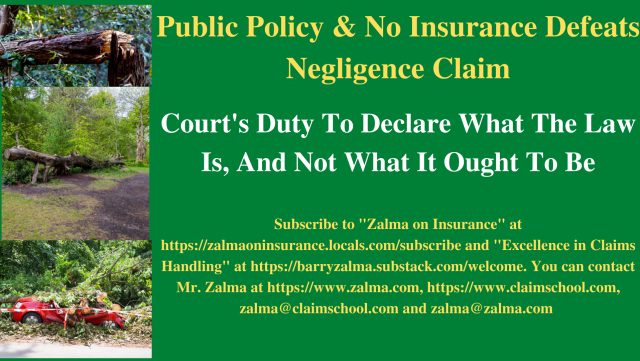Public Policy & No Insurance Defeats Negligence Claim
Court’s Duty Is To Declare What The Law Is, And Not What It Ought To Be
L eodis Sledge appealed the trial court’s grant of summary judgment to the City of Pine Bluff, Arkansas, et al on his claims of negligence that he asserted were the proximate cause of Leach’s death on April 16, 2020.
eodis Sledge appealed the trial court’s grant of summary judgment to the City of Pine Bluff, Arkansas, et al on his claims of negligence that he asserted were the proximate cause of Leach’s death on April 16, 2020.
In Leodis Sledge, Individually And As Administrator Of The Estate Of Tanesha Leach, Deceased, And On Behalf Of All Wrongful Death Beneficiaries And Heirs At Law v. City Of Pine Bluff, Arkansas, By And Through Its Mayor, Shirley Washington, In Her Official Capacity As Mayor Of The City Of Pine Bluff, Arkansas; Pine Bluff City Council, By And Through Its Ex-Officio President, Shirley Washington, In Her Official Capacity; Rick Rhoden, In His Official Capacity As Director Of Pine Bluff Street Department; And Kelvin Sargent, In His Official Capacity As Chief Of Police Of The City Of Pine Bluff, No. CV-20-547, 2022 Ark.App. 23, Court of Appeals of Arkansas, Division IV (January 19, 2022) the Court of Appeal responded applying the law.
FACTS
On April 12, 2020, a large line of severe thunderstorms containing straight-line winds and tornadoes passed through Arkansas, including Jefferson County, where Pine Bluff is located. As a result of these storms, Jefferson County was declared by the governor to be a disaster area. Pine Bluff suffered hundreds of uprooted trees as a result of the extreme winds, and more than 33,000 Entergy customers lost power as a result of the storms. One of the downed trees partially obstructed the road on Hutchison Street near Smart Street. From April 13 to April 16, there were several documented 911 calls regarding the downed tree as well as several records indicating that both the police department and the street department were notified of the downed tree. However, no officers remained on the scene of the downed tree, no barriers were erected around the tree, and the street was not closed.
On April 14, a motorist reported that he almost hit the tree and that it could not be seen until you were “right up on it.” Early on the morning of April 16, 2020, Kelli Shavers hit the downed tree while driving her vehicle. Tanesha Leach, who was a passenger in Shavers’s vehicle, was killed. Shavers stated that she knew there was a downed tree on Hutchison Street, but she did not remember exactly where it was located, it was dark, and even though she slowed her vehicle as she believed she was getting close to the tree, she still hit the tree.
The appellees moved for summary judgment on Sledge’s complaint, asserting municipal immunity on the basis that it had no general-liability coverage under Arkansas Code Annotated section 21-9-301.
The circuit court granted the motion for summary judgment, finding that although Sledge had pleaded sufficient facts to establish a prima facie case of “utter indifference and conscious disregard,” Arkansas Code Annotated section 21-9-301 grants municipalities immunity from liability and from suits for damages except to the extent they may be covered by liability insurance, and on the basis of Mayor Washington’s affidavit, the city was not covered by liability insurance against negligent actions at the time of the incident in which Leach was killed. This timely appeal followed.
DISCUSSION
Arkansas courts have held that, when a circuit court’s order specifies a particular ground for the court’s decision, that ground alone is subject to our review. If the circuit court’s order is more in the nature of a “blanket” decision and does not articulate a particular basis for its ruling, then the order encompasses all of the issues presented to the circuit court in the parties’ briefs and arguments.
The circuit court granted the defendants’ motion for summary judgment on the basis that Arkansas Code Annotated section 21-9-301 grants municipalities immunity from liability and from suit for damages except to the extent they may be covered by liability insurance.
A suit against a public employee in his or her official capacity is merely a suit against the public employer. Qualified immunity is not a defense available to governmental entities, but only to government employers sued in their individual capacity. Because Sledge sued the public officials in their official capacities only, qualified immunity is not at issue.
Sledge’s complaint alleged “that the appellees’ conduct constituted gross negligence; a reckless indifference to the consequences of a known risk of an abnormally dangerous condition; and willful and wanton neglect in total disregard of the health and safety of Tanesha Leach” because they knew the downed tree “created a dangerous condition that would probably lead to serious injury or death if not removed from the street or if unsuspecting motorists traveling along North Hutchinson Street were not warned of the danger,” and appellees failed to remove the downed tree or to warn unsuspecting motorists of the danger for three days, until the wreck that claimed Leach’s life.
Arkansas Code Annotated section 21-9-301, provides: “(a) It is declared to be the public policy of the State of Arkansas that all counties, municipal corporations, school districts, public charter schools, special improvement districts, law enforcement agencies for and certified law enforcement officers employed by a public or private institution of higher education, and all other political subdivisions of the state and any of their boards, commissions, agencies, authorities, or other governing bodies shall be immune from liability and from suit for damages except to the extent that they may be covered by liability insurance.”
This statute provides city employees with immunity from civil liability for negligent acts but not for intentional acts.
It is the court’s duty to declare what the law is, and not what it ought to be. In determining the meaning of a statute, we construe it just as it reads, giving words their ordinary and usually accepted meaning in common language. A plain reading of section 21-9-301 provides immunity from torts for municipalities except to the extent that they may be covered by liability insurance.
The mayor’s affidavit is sufficient proof to establish that Pine Bluff did not have insurance coverage to provide coverage for Sledge’s negligence claims. An affidavit stating that there is no general-liability coverage establishes a prima facie entitlement to summary judgment. Sledge failed to meet proof with proof to demonstrate the existence of a genuine issue of material fact on this issue. Therefore, the appellees were entitled to municipal immunity and summary judgment was proper.
ZALMA OPINION
If the city had purchased insurance the plaintiff would have a great case and collected real damages. However, the court interpreted the law as it was written and since there was no insurance purchased by the city the Legislature made them immune.

© 2022 – Barry Zalma
Barry Zalma, Esq., CFE, now limits his practice to service as an insurance consultant specializing in insurance coverage, insurance claims handling, insurance bad faith and insurance fraud almost equally for insurers and policyholders.
He practiced law in California for more than 44 years as an insurance coverage and claims handling lawyer and more than 54 years in the insurance business.
Subscribe to “Zalma on Insurance” at https://zalmaoninsurance.locals.com/subscribe and “Excellence in Claims Handling” at https://barryzalma.substack.com/welcome.
You can contact Mr. Zalma at https://www.zalma.com, https://www.claimschool.com, zalma@claimschool.com and zalma@zalma.com . Mr. Zalma is the first recipient of the first annual Claims Magazine/ACE Legend Award.
You may find interesting the podcast “Zalma On Insurance” at https://anchor.fm/barry-zalma; you can follow Mr. Zalma on Twitter at; you should see Barry Zalma’s videos on YouTube- https://www.youtube.com/channel/UCysiZklEtxZsSF9DfC0Expg; or videos on https://rumble.com/zalma. Go to the Insurance Claims Library – https://zalma.com/blog/insurance-claims–library/ The last two issues of ZIFL are available at https://zalma.com/zalmas-insurance-fraud-letter-2/







